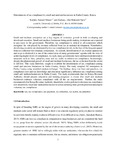Determinants of tax compliance by small and medium businesses in Embu County, Kenya

View/
Date
2019-04Author
Kariuki, Samuel Nduati
Njeru, Zachary John Mukundi
Metadata
Show full item recordAbstract
Small and medium enterprises are a key engine of economic growth in both developing and developed countries. Small and medium businesses being profit making institutions are expected to pay taxes to the government. Therefore, tax compliance is critical in all economies which recognize the role played by revenue collected from tax in national development. Nonetheless, developing countries are dominated by low tax compliance levels, in the face of the frequent appeal from tax collectors for voluntary compliance. As a result, identification of tax evasion approaches and ways to diminish it is one of the central aims of many governments’ agenda with the view of achieving higher levels of compliance. As such, many governments have embraced administrative measures such as fines, penalties, rates and tax audits to enforce tax compliance. Interestingly, despite the phenomenal growth of small and medium businesses, the tax collection from the sector is still low. This study therefore, sought to establish the determinants of tax compliance among small and medium businesses in Embu County, Kenya. The study sampled 185 enterprises in Embu County using stratified random technique. The findings show that fines and penalties, tax compliance costs and tax knowledge and education significantly influence tax compliance among small and medium businesses in Embu County. The study recommends that the Kenya Revenue Authority should prepare education and training programs to ensure that small and medium businesses embrace voluntary compliance with all the tax requirements. Further, the study recommends that Kenya Revenue Authority should also evolve policies to decrease tax compliance cost incurred by small and medium businesses to avoid curtailing their growth potential and inspire voluntary tax compliance
